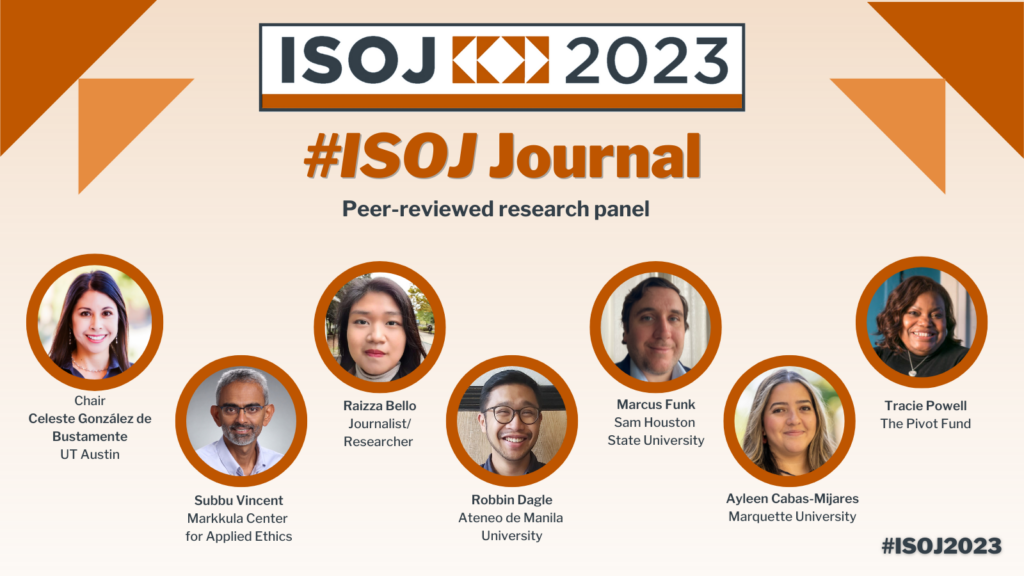April 7, 2023 | ISOJ2023, Registration, Research
Journalism scholars to present diverse research findings during ISOJ 2023
For almost two decades, research has been a vital component of the International Symposium on Online Journalism (ISOJ), with the participation of scholars in online journalism from around the world.
Two sessions of ISOJ 2023 will feature several presentations on the findings of research projects on a variety of topics related to the evolution of journalism in the digital age, including peer-reviewed articles submitted to a competitive process for publication in the conference journal.
On Friday, April 14, at 1:15 p.m. U.S. Central Time, scholars whose work is featured in volume 13 of the #ISOJ Journal will present their peer-reviewed research during the main plenary session. The journal will be published online at isoj.org that same day.

The research panel will be led by Celeste González de Bustamante, professor and associate dean at UT Austin’s Moody College of Communication. She will be joined by authors of the paper published in #ISOJ Journal:
- Subbu Vincent, director of journalism and media ethics at Markkula Center for Applied Ethics, will present Could Quoting Data Patterns Help in Identifying Journalistic Behavior Online?
- Raizza Bello, independent journalist and researcher, and Robbin Dagle, lecturer in the Department of Communication at Ateneo de Manila University, will present Of Media Shifts and Crises: Mapping Digital Journalism and News Deserts in the Philippines
- Marcus Funk, associate professor of mass communication at Sam Houston State University, will present Five stars because they tell it like it is: A parasocial examination of mainstream, conservative and far right reviews on Apple Podcasts
- Ayleen Cabas-Mijares, assistant professor of journalism and media studies at Marquette University, will present “News You Can Use:” Pragmatic Solidarity as a News Value in Online Community Journalism
- Tracie Powell, founder of The Pivot Fund, will present Architects of necessity: Assessing philanthropic support for BIPOC news startups
The research component of ISOJ was added in 2004 and #ISOJ, the official research journal of the conference, was subsequently launched in 2011. The #ISOJ Journal features articles based on original research, methodologies relevant to the study of journalism and innovative technologies, critical syntheses of research and theoretical perspectives on journalism today.
Then, on Saturday, April 15 at 8:00 a.m. U.S. Central Time, more scholars will present their current research at a breakfast. It is open to all ISOJ registrants, but in person attendees must register separately. It will be held in English, without interpretation.

The breakfast is chaired by Cindy Royal, a professor in the School of Journalism and Mass Communication at Texas State University where she is the founding director of the Media Innovation Lab.
It will include research from:
- Carrie Brown, founding director of the engagement journalism master’s program at the Newmark Graduate School of Journalism at CUNY. She will talk about her book co-authored with Jonathan Groves, “Transforming Newsrooms,” and a new model for improving newsroom cultures and adapting to changes in the news industry. Then, she will discuss her ideas for future research directions.
- Celeste González de Bustamante, professor and associate dean for diversity, equity and inclusion in the Moody College of Communication at The University of Texas at Austin. She will talk about her recent book “Surviving Mexico: Resistance and Resilience among Journalists in the Twenty-first Century,” which examines how journalists in Mexico have endured dangerous environments and threats.
- Alfred Hermida, co-founder of The Conversation Canada and a journalism professor at the University of British Columbia. As part of the Global Journalism Innovation Lab, Hermida is studying the role of journalism startups in creating new infrastructures for outlets and transforming the field.
- Sue Robinson, a professor at the School of Journalism and Mass Communication at the University of Wisconsin-Madison. Robinson will discuss how journalists can partner with local news outlets to reduce polarization and build trust with communities.
Be part of ISOJ’s rich tradition of reviewing the latest in online journalism scholarship and plan to attend these sessions next week!
ISOJ, which began in 1999, brings together journalists, media executives, scholars and students to discuss the impact of technology on journalism today and in the future. It is an innovative conference that bridges the gap between the news industry and academia.
For updates and additional information, you can visit ISOJ’s website, Twitter or Facebook. If you have any questions, please contact us at isoj@austin.utexas.edu.

